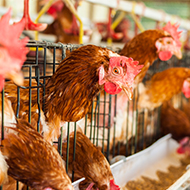Bluetongue restrictions eased
There have been more than 80 cases of BTV-3 since November.
The Animal and Plant Health Agency (APHA) has eased some of its Bluetongue virus (BTV) restrictions following a reduction in midge activity.
Infected animals are no longer being culled in cases where test results indicate an older infection and the presence of BTV antibodies. However, infected animals may still be restricted at their current locations and other measures taken to mitigate the spread of the disease.
Restrictions for moving livestock within and into the Kent and Norfolk Temporary Control Zones are also being eased. Live animals will be allowed out of the zones if they meet certain conditions, including testing negative in pre-movement tests.
The change in approach comes as the affected areas enter a seasonally low vector period. Midges, which spread the disease, are no longer feeding, and low temperatures mean that the virus cannot replicate in midges, reducing the risk of transmission further.
Surveillance measures are continuing and cases are still being detected in the existing TCZs. A new case was confirmed at a premises near Reedham in the Norfolk TCZ yesterday (6 February), bringing the total number of cases to 85 since the BTV-3 strain was first identified in England in November.
Christine Middlemiss, chief veterinary officer, said: “These detections are an example of our robust disease surveillance procedures in action and it is also a clear reminder for farmers that the disease remains a threat, despite coming towards the end of the midge activity season.
“We are now in a seasonally low vector period, when midge activity is much lower and there is reduced risk of disease, however I urge farmers to remain vigilant and report any suspicions to APHA.”
Image © Shutterstock



 An Avian Influenza Prevention Zone (AIPZ) has been introduced across Wales.
An Avian Influenza Prevention Zone (AIPZ) has been introduced across Wales.